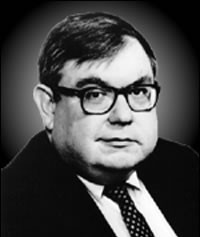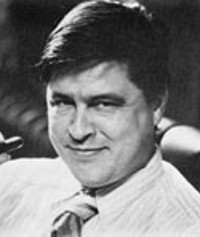 Samuel T. Francis
Samuel T. Francis
Championing
Western Civilization
and the great legacies of
Sam Francis and Joe Sobran
and their allies
 Joseph Sobran
Joseph Sobran
FGF E-Package
Samuel Francis Classics
June 4, 2010
Media Elite versus Christian Heritage
A classic by Sam Francis
Fitzgerald Griffin Foundation
Easter, the most important religious holiday in the Christian calendar, passed almost without comment in the nation’s press this year, but the Washington Post did carry a story somewhat related to it. The story had to do with the comic strip B.C. and its creator, artist Johnny Hart, who is a born-again Christian. But what the story really told us was perhaps more than it intended about the establishment media’s view on open religious expression.
Mr. Hart in recent years has gotten into the habit of importing explicit—often very explicit—Christian messages in his strip, which is cast in prehistoric times and is a thinly masked commentary on modern life. The problem is that many newspaper editors, including some at the Post, don’t much care for that sort of thing. Some of them simply refuse to publish those B.C. strips that thump a religious drum.
B.C., which appears in more than 1,200 newspapers, is one of the most popular cartoon strips published. But that doesn’t mean every paper carries it. The Chicago Sun-Times dropped the strip entirely, and the Denver Post and the Los Angeles Times carry it only when it doesn’t talk about religion. The Washington Post runs it Monday through Saturday but never on Sunday, because that’s when Mr. Hart mounts his pulpit most often.
Sometimes the Post kills individual B.C. strips if they are deemed to be too religious. And of course, the media that do all the killing have a bucketful of reasons why they’re all for freedom of the press.
Yet the media lords aren’t the only ones who have problems with B.C. The Post’s “Style” section piece on Mr. Hart and his strip interviewed Abraham Foxman, president of the Anti-Defamation League of B’nai B’rith. He is sort of the national censorship czar when it comes to publications that might offend Jewish sensitivities. Mr. Hart’s strip is one such publication.
While rather graciously acknowledging that Mr. Hart has a right to express his religious convictions and saying he “does not believe in stifling free speech,” Mr. Foxman “confesses to uncertainty” about B.C. and declares that the strip’s frequent Christian messages are “particularly insidious.” “It is a very clear exclusionary message if you are not of that faith,” he pronounces.
Mr. Foxman does not represent all Jewish opinion, and the Post story also cites law professor Daniel Polsby, whom it identifies as Jewish, who “thinks Hart is a hero of free speech.” Moreover, Mr. Hart’s critics say the issue is not his Christianity per se, but religion per se. Leonard Downie, the Post’s executive editor, has killed several of Mr. Hart’s cartoons because, he says, “We don’t promote individual religions anywhere in the paper. We let people discuss religion as an issue, but we don’t advocate a particular religion.”
Well now, that’s swell, isn’t it? “We”—the Post, the other papers, the Anti-Defamation League, and everybody else apparently except the millions of American newspaper readers who actually do advocate particular religions—decide what gets promoted and what doesn’t. Religion, for them, is in the same category—maybe even in a somewhat more taboo category—as outright obscenity and explicit racial epithets. Advocating a specific religious position is forbidden—except, of course, the intensely religious position of secularism.
Mr. Hart does indeed seem to harbor ideas and beliefs that I, for one, consider rather nutty, both from religious as well as scientific perspectives. He believes the world was created only 4,000 years ago and doesn’t believe in the cavemen who populate his own cartoon strip. But he has as much right to these beliefs and to draw cartoons expressing his faith as anyone who believes something else.
What the elite media deny is not that right in the abstract but any concrete opportunity for Mr. Hart to exercise it. It’s fine to thump your chest about how committed you are to freedom of expression. But when you insinuate that someone is “anti-Semitic” and effectively deny him a place in your newspaper explicitly because of his religious beliefs, your “commitment to free expression” is meaningless.
Mr. Hart’s importance does not lie in the truthfulness of his beliefs or even in the clever ways he expresses them. Rather, it lies in the fact that simply by expressing them he helps expose the Big Lies of “tolerance,” “diversity,” and “freedom” that the media chieftains are always yapping about. There is tolerance, diversity, and freedom for those views of which the elite media approve. For those views they don’t like and don’t want to publish—and explicit Christian commitments are among them—the media send a very clear exclusionary message.
[This column is reprinted from Shots Fired: Sam Francis On America's Culture War (FGF Books, 2006).]
Back to Samuel Francis Classics archives
The Samuel Francis Classics are copyright © @ 2025
by the Fitzgerald Griffin Foundation, www.fgfbooks.com.
All rights reserved.
Political pundit Samuel Francis was an author and syndicated columnist. A former deputy editorial page editor for THE WASHINGTON TIMES, he received the Distinguished Writing Award for Editorial Writing from the American Society of Newspaper Editors in both 1989 and 1990.
SHOTS
FIRED: SAM FRANCIS ON AMERICA'S CULTURE WAR, a collection of some
of Mr. Francis' writing and speeches,
was published by FGF Books, a division of the Fitzgerald
Griffin Foundation.
To sponsor the FGF E-Package, please send a tax-deductible donation to the:
Fitzgerald Griffin Foundation
344 Maple Avenue West, #281
Vienna, VA 22180
1-877-726-0058
publishing@fgfbooks.com
Or call us toll-free at 1-877-726-0058